Related Research Articles

Sierra Leone, officially the Republic of Sierra Leone, informally Salone, is a country on the southwest coast of West Africa. It is bordered by Liberia to the southeast and Guinea to the northeast. Sierra Leone has a tropical climate with a diverse environment ranging from savanna to rainforests, a total area of 71,740 km2 (27,699 sq mi) and a population of 7,092,113 as of the 2015 census. The capital and largest city is Freetown. The country is divided into five administrative regions which are subdivided into sixteen districts. Sierra Leone is a constitutional republic with a unicameral parliament and a directly elected president. Sierra Leone is a Muslim-majority country at approximately 78%, though with an influential Christian minority at about 21%. Muslims and Christians in Sierra Leone are extremely tolerant of each other, and all the major Muslim and Christian holidays are officially national holidays in the country.
Sierra Leone first became inhabited by indigenous African peoples at least 2,500 years ago.The Limba were the first tribe known to inhabit Sierra Leone. The dense tropical rainforest partially isolated the region from other West African cultures, and it became a refuge for peoples escaping violence and jihads. Sierra Leone was named by Portuguese explorer Pedro de Sintra, who mapped the region in 1462. The Freetown estuary provided a good natural harbour for ships to shelter and replenish drinking water, and gained more international attention as coastal and trans-Atlantic trade supplanted trans-Saharan trade.
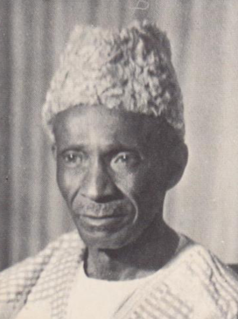
Sir Milton Augustus Strieby Margai was a Sierra Leonean doctor and politician who served as the country's head of government from 1954 until his death in 1964. He was titled Chief Minister from 1954 to 1960, and then Prime Minister from 1961 onwards. Margai studied medicine in England, and upon returning to homeland became a prominent public health campaigner. He entered politics as the founder and inaugural leader of the Sierra Leone People's Party. Margai oversaw Sierra Leone's transition to independence, which occurred in 1961. He died in office aged 68, and was succeeded as prime minister by his brother Albert. Margai enjoyed the support of Sierra Leoneans across classes, who respected his moderate style, friendly demeanor, and political savvy.
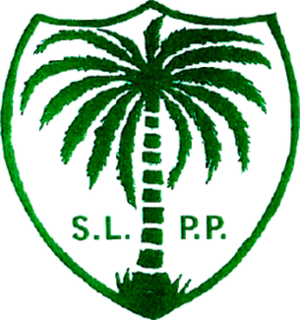
The Sierra Leone People's Party (SLPP) is one of the two major political parties in Sierra Leone, along with it main political rival the All People's Congress (APC). It is the current ruling party in Sierra Leone since 4 April 2018.

Siaka Probyn Stevens was the leader of Sierra Leone from 1967 to 1985, serving as Prime Minister from 1967 to 1971 and as President from 1971 to 1985. Stevens' leadership was often characterized by patrimonial rule and self-indulgence, consolidating power by means of corruption and exploitation.
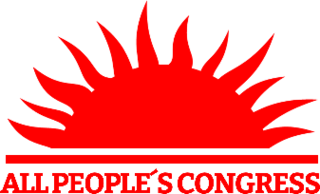
The All People's Congress (APC) is one of the two major political parties in Sierra Leone, the other being it main political rival the Sierra Leone People's Party (SLPP). The APC is the main opposition party in Sierra Leone since 4 April 2018 when Julius Maada Bio of the SLPP won the 2018 presidential elections, though it maintains a majority in parliament.
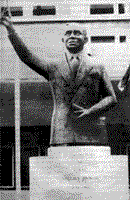
Isaac Theophilus Akunna Wallace-Johnson was a Sierra Leonean and British West African workers' leader, journalist, activist and politician. Born into a poor Creole family in British Sierra Leone, he emerged as a natural leader in school. After attending United Methodist Collegiate School for two years, he dropped out and took a job as an officer in the customs department in 1913. He was dismissed for helping organize a labour strike, but later reinstated to his position a year later. After resigning from his job, he enlisted as a clerk with the Carrier Corps during World War I. After being demobilised in 1920, Wallace-Johnson moved from job to job, before settling as a clerk in the Freetown municipal government. He claimed to have exposed a corruption scandal, which resulted in the incarceration of top officials, including the mayor. After being fired from this job in 1926, he left Sierra Leone and became a sailor. He joined a national seamen union and it is believed that he also joined the Communist Party. In 1930, he helped form the first trade union in Nigeria and attended the International Trade Union Conference of Negro Workers in Hamburg, where he established a number of contacts. He published articles and edited the Negro Worker, a journal devoted to uniting black workers around the world. He travelled to Moscow, where he claimed to have attended classes on Marxism-Leninism theory, union organisation and political agitation.
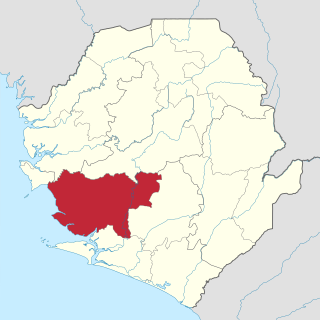
Moyamba District is a district in the Southern Province of Sierra Leone, with a population of 318,064 in the 2015 census. Its capital and largest city is Moyamba. The other major towns include Njala, Rotifunk and Shenge. The district is the largest in the Southern Province by geographical area, occupying a total area of 6,902 km2 (2,665 sq mi) and comprises fourteen chiefdoms.
Sir Albert Michael Margai was the second prime minister of Sierra Leone and the half-brother of Sir Milton Margai, the country's first Prime Minister. He was also the father of Sierra Leonean politician Charles Margai.

Bonthe District is a district comprises several islands and mainland of the Atlantic Ocean in the Southern Province of Sierra Leone. Bonthe is one of the sixteen districts of Sierra Leone. Its capital is the town of Mattru Jong and its largest city is Bonthe, on Sherbro Island. As of the 2015 census, the district had a population of 200,730. Bonthe District is one of the sixteen districts of Sierra Leone. Bonthe District is subdivided into eleven chiefdoms.

Parliament of Sierra Leone is the legislative branch of the government of Sierra Leone. It is principally responsible for making laws. The Sierra Leone parliament consists of 146 members, of which 132 members are directly elected from across Sierra Leone's 16 districts, while 14 are paramount chiefs appointed from the 14 rural districts. The parliament is led by the Speaker of the House; the position is currently held by Abass Bundu of the Sierra Leone People's Party. The current elected 132 ordinary members of parliament are composed of members of the All People's Congress, the Sierra Leone People's Party which are the two largest political parties in Sierra Leone plus two other parties, the National Grand Coalition and the Coalition for Change and finally, three Independent members who were not elected under any party.
The People's Movement for Democratic Change (PMDC) is a socially liberal party in Sierra Leone. It is a breakaway faction of the Sierra Leone People's Party (SLPP). It was officially registered on 19 January 2006. The party is led by Charles Margai, the son of Sierra Leone's second prime minister Sir Albert Margai and the nephew of Sir Milton Margai. The PMDC is based in the country's second largest city of Bo.

Ernest Bai Koroma is a Sierra Leonean politician who served as the fourth President of Sierra Leone from 17 September 2007 to 4 April 2018.

Kenema District is a district in the Eastern Province of Sierra Leone. Its capital and largest city is Kenema, which is the third most populous city in Sierra Leone, after Freetown and Bo. Tongo is the second most populous city in the district. Other major towns in Kenema District include Blama and Yomboma. The district is the most populous district in the Eastern province with a population 609,873. Kenema District has an area of 6,053 km2 (2,337 sq mi) and comprises sixteen chiefdoms.

General elections were held in Sierra Leone on 11 August 2007. Seven candidates competed in the first round of the presidential election; no candidate received the necessary 55% of the vote to win in the first round, and a second round was held between the top two candidates, Ernest Bai Koroma of the All People's Congress (APC) and Solomon Berewa of the Sierra Leone People's Party (SLPP), on 8 September. According to official results, Koroma won the election with 54.6% of the vote.
The Peoples Party of Sierra Leone was a political party formed by Lamina Sankoh in 1948. The party sought to unite the British Crown Colony of Freetown with the protectorate of Sierra Leone, which were governed separately until independence in 1961. The party merged with 2 other organizations in 1951 to form the Sierra Leone Peoples Party (SLPP), which is today one of the two major parties in the government of the country.
Herbert Christian Bankole-Bright was a well-known politician in Sierra Leone.

General elections were held in Sierra Leone Colony and Protectorate in November 1951.

In April 1961, Sierra Leone became politically independent of Great Britain. It retained a parliamentary system of government and was a member of the British Commonwealth of Nations. The Sierra Leone People's Party (SLPP), led by Sir Milton Margai were victorious in the first general election under universal adult franchise in May 1962. Upon Sir Milton's death in 1964, his half-brother, Sir Albert Margai, succeeded him as Prime Minister. Sir Albert attempted to establish a one-party state had the ready cooperation of the opposition All People' Congress but met fierce resistance from some cadre within his party Sierra Leone People's Party (SLPP) and ultimately abandoned the idea.

General elections were held in Sierra Leone Colony and Protectorate for the first time on 28 October 1924. The National Congress of British West Africa won all three seats.
References
- "Bright, Herbert Christian Bankole-", Oxford Dictionary of National Biography
- "Sierra Leone POLITICAL PARTIES", Encyclopedia of the Nations
- Akintola J. G. Wyse, H. C. Bankole-Bright and Politics in Colonial Sierra Leone, 1919-1958
- Freddie Balogun Savage, Political and Constitutional Development in Sierra Leone, 1951-60